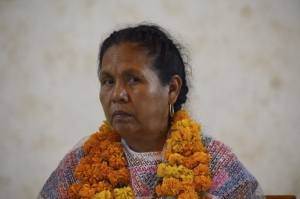
On Jan. 20 the anniversary of the J20 protest at Donald Trump’s inauguration, people gathered in New York City to hear two representatives from the National Indigenous Congress of Mexico (CNI-Congreso Nacional Indigena) in a full day of food, performances and a panel. The CNI is on a Gira por la Vida (Tour for Life) to U.S. cities.
Many people from many organizations and different communities were there. At the entrance of the Holyrood Episcopal Church, in Washington Heights, one was greeted by a woman with jet-black hair wearing a red bandana half-mask and holding a sign that said “Decolonize Feminism.”This group had just come from the New York City 2018 Women’s March, where they participated as a contingent.
The CNI was born out of the peace dialogues in 1996, in San Andres, Chiapas, Mexico, in which the Zapatista Army of National Liberation (EZLN) negotiated with the Mexican government to allow for the self-determination of Mexico’s Indigenous communities. Since then, the CNI has created 30 “good government” councils. It seeks to unite the common interests of the Indigenous groups in Mexico.
For 20 years, they had no intention of engaging with electoral politics, in protest of the systemic and consistent violation of their sovereignty, land and lives. This changed in 2016, when they announced an Indigenous woman to represent them, known as María de Jesús Patricio Martínez, or Marichuy, in the 2018 Mexican elections. Marichuy is a Nahua Indigenous person, a traditional medical healer and a human rights activist.
Some might wonder why the CNI is participating in an election of a state that is not serving them. The CNI makes it clear that they do not seek power, but rather use this as an invitation to the Mexican people to engage with a different type of politics based on grassroots power. It also serves as an implicit invitation to them to envision a society drastically different than the one being offered by the current Mexican state.
Presidential campaign to unmask the Mexican government
During the Jan. 20 panel, Francisco Grado Villa, a CNI representative, mentioned that the presidential campaign will also help “take the mask off the Mexican government [and reveal that it ] works in the interests of the ruling class.” The CNI was also influenced by their Zapatista comrades.
Betina Cruz, also a CNI representative, recalled a Zapatista asking her, “How much longer are we going to take this?” It was at this moment that they decided to “unprecedentedly” participate in the upcoming election, she said.
Why tour the United States at this time? The stated purpose of Gira por la Vida is to heighten consciousness, particularly in the Mexican migrant community, about the multitudes of struggles of Indigenous communities in Mexico. In doing this, they are hoping to build a broader network of solidarity with the Mexican migrant community by condemning the economic and social conditions that necessitated their migration. They are organizing to register the Mexican migrant diaspora to vote for Marichuy. Additionally, they are sending a message to U.S. citizens to oppose and condemn their own government for selling arms in Mexico, as it is directly impacting Indigenous communities.
Current Indigenous struggles in Mexico
In this vein, the CNI representatives discussed the current political situation in Mexico and how it affects their communities. The overarching struggle for Indigenous communities in Mexico is self-determination of their own communities and territories. They are resisting the Mexican government’s giving land to transnational corporations for mining industries, oil industries, and tourism. Other battles include those against systemic poverty, incarceration and the direct killing of their people. Given all this, it is not surprising that they named their tour after the very thing that they’re struggling for: Life. A sense of urgency was felt by all when Cruz described what motivates their communities to keep resisting:
“We know it’s not easy. At some level, everyone is fighting this system, more often individually, but we will never win that way, and our lives are at stake. [The government] sees us an enterprise, something to make money off of. Otherwise, they displace us, they jail us, or they kill us. If we do not learn to articulate ourselves, if we do not organize ourselves, there is no future…These capitalist parties will not help us not be exploited. They sell everything, even at the expense of human life…This is not about winning the presidency, our goal is to build an anti-capitalist society.”
Workers and oppressed in U.S. and Mexico seek the same thing
Karina Garcia from the Justice Center en El Barrio, another panelist, reflected on the message of the CNI by saying “I was truly affected by your vision because it seems that we (organizers at the Justice Center) are walking on the same path as you.” The working class in the U.S., she said, is inadequately represented by a congress of millionaires. She condemned the Democrats for pretending to be the answer people seek and the one vehicle for change, when in reality their interests lie in co-optation of radical movements for their own political gain.
Garcia echoed the view of Cruz and Grado Villa that the changes people seek cannot be accomplished under the current system. She found common ground between the Zapatista Struggle for Life and the People’s Congress of Resistance’s Point 1 in the Manifesto: “To meet all social needs and to ensure basic necessities necessary to live.” Like the Zapatista struggle, she said, people in the United States are looking for actual, profound change, a radical alternative to capitalism. Noting the amount of crises capitalism creates, she noted a drastic change in perception of socialism, and perceives a real opportunity to organize and fight back.
It is with this sentiment, one of grassroots power, rejection of bourgeois politicians and the system they uphold, and enthusiasm for a new future, that the people at this event resolved to approach the rest of 2018.





